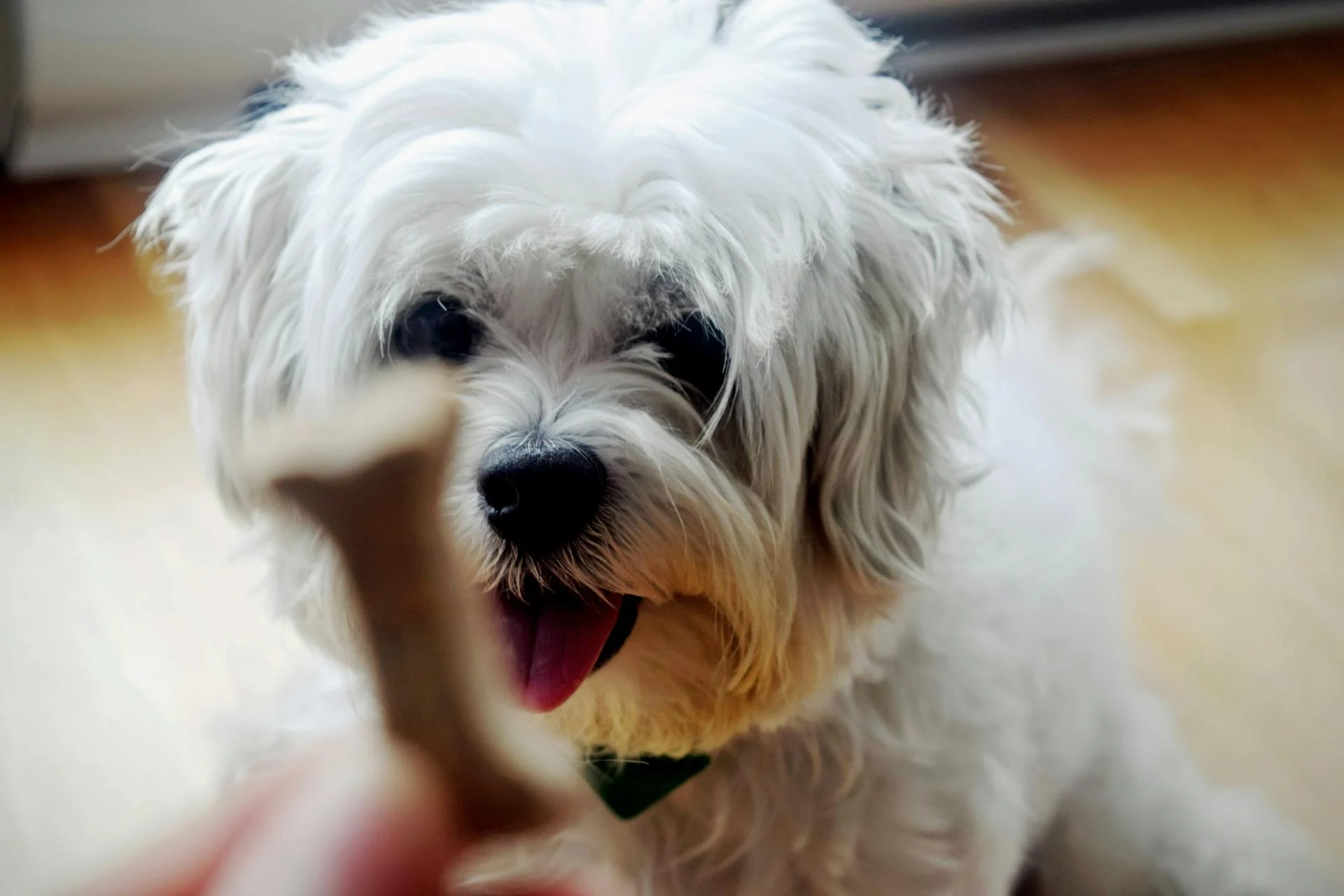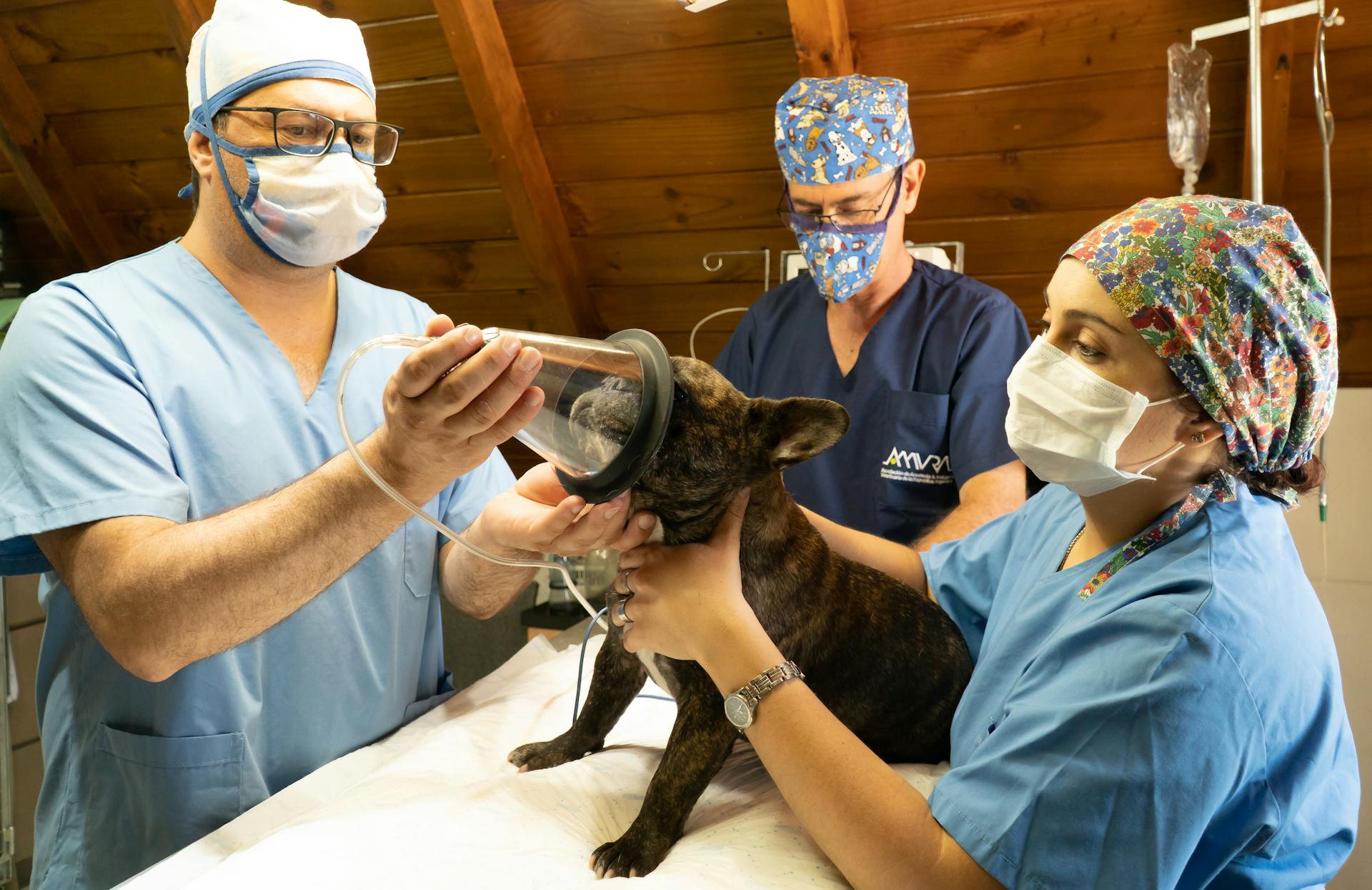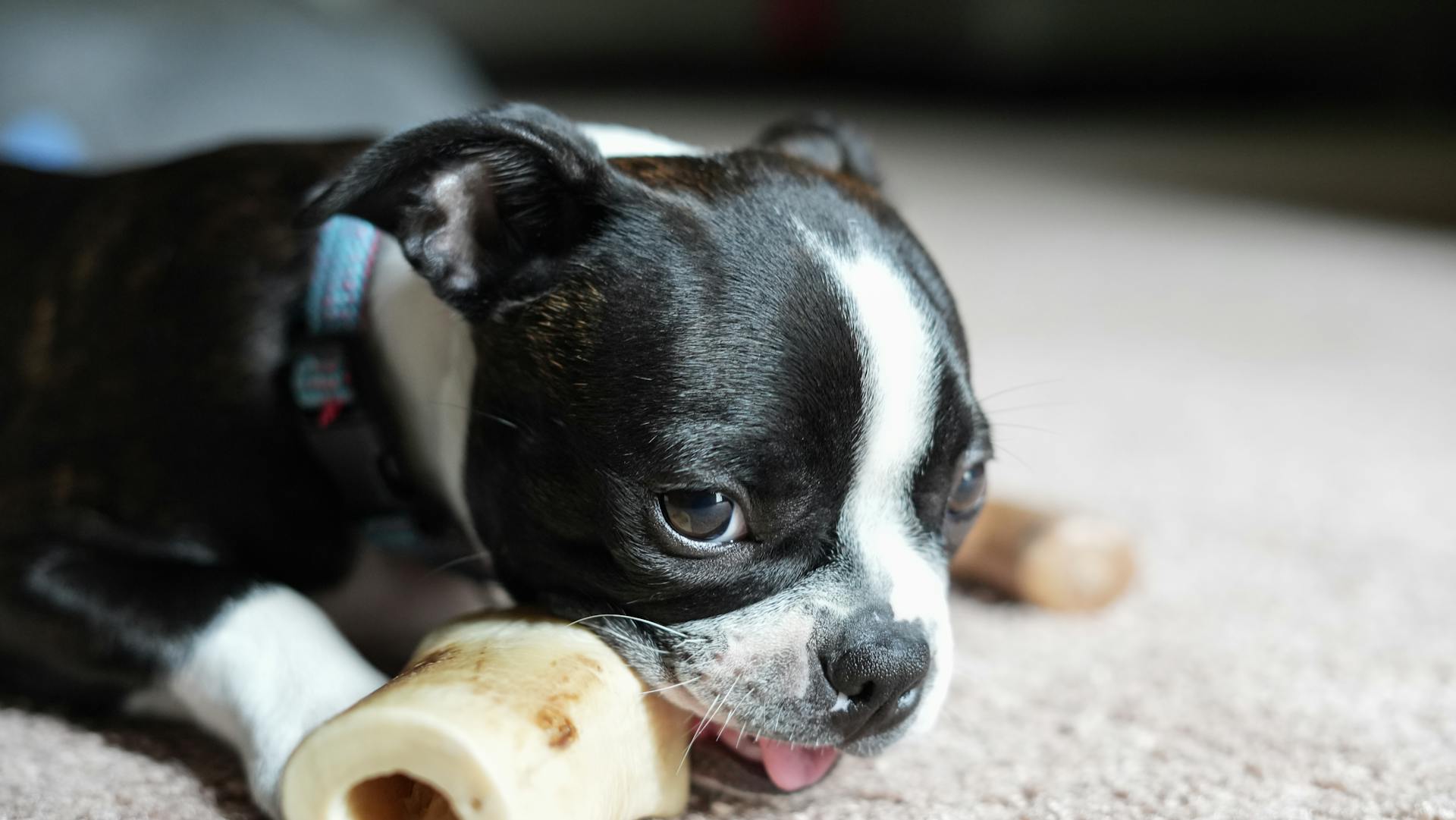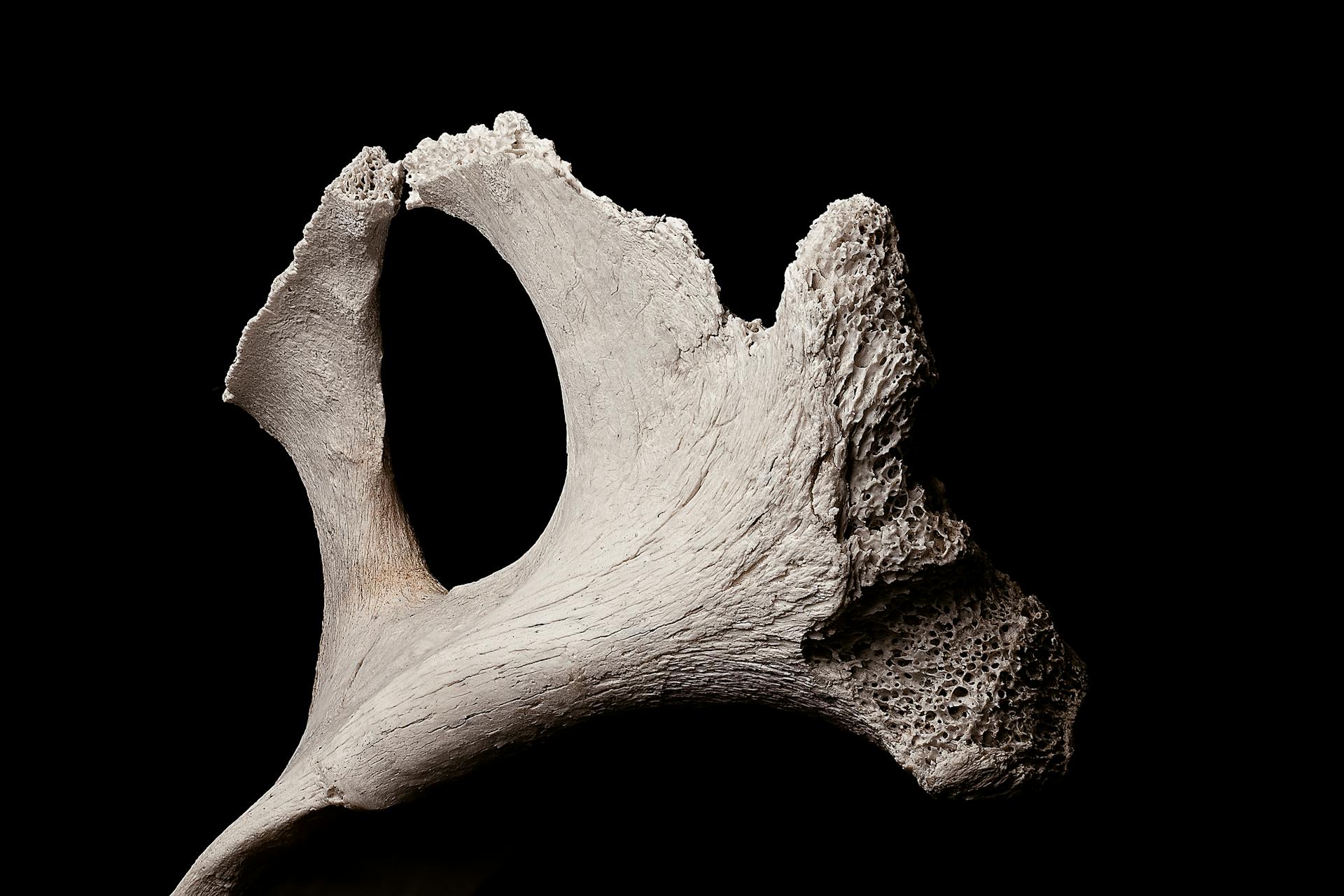
Dogs eating bones can be a natural behavior, but it's essential to understand the risks and benefits involved. Some dogs love to chew on bones, which can be a great way to keep them occupied and satisfied.
Chewing on bones can help remove plaque and tartar from a dog's teeth, reducing the risk of dental problems. However, this benefit is often outweighed by the risks of choking, obstruction, or splintering.
Bones can splinter or break into sharp pieces, which can cause internal injuries or get stuck in your dog's digestive tract. This is a serious concern, especially for small dogs or puppies.
Some bones, like chicken or beef bones, are considered safe for dogs to eat in moderation, but it's crucial to supervise and monitor your dog's behavior to prevent any potential issues.
Risks of Eating Bones
Cooked bones can shatter and cause serious damage to your dog's mouth, throat, or intestines. They can also get stuck in your dog's mouth or throat.
Additional reading: Dog with Bone in Mouth
Raw chicken bones are not safe for dogs to eat, as they can get stuck on the roof of a dog's mouth and cause injury. Raw chicken meat also poses a risk of bacterial infection.
Some bones, like rib bones, are high in fat and can cause pancreatitis in dogs. This can be a life-threatening condition, so it's essential to keep these bones out of reach.
Bones can irritate canine stomachs and cause diarrhea and irritable bowel syndrome. This can be especially problematic for dogs with sensitive stomachs.
Fatty Acids Can Cause Pancreatitis
Fatty acids in bones can cause pancreatitis in dogs. This is especially true for pork rib bones, which are high in saturated fat.
Dogs aren't built to handle this amount of fat, and it can lead to pancreatitis, an inflammation of the pancreas. Symptoms of pancreatitis include vomiting, lethargy, diarrhea, and loss of appetite.
Severe cases of pancreatitis can be deadly, so it's crucial to seek veterinary attention right away if you suspect your dog may have pancreatitis.
Discover more: Canine Pancreatitis Diet Recipes
Can Irritate Stomachs
Bones can irritate canine stomachs, leading to diarrhea and irritable bowel syndrome. This is because bones and their marrow can cause stomach upset.
A bone can further irritate already sensitive stomachs, making it even more uncomfortable for your dog.
If your dog eats a bone, it's not just about the immediate discomfort - it's also about the long-term risks.
Severe Constipation or Bloating
If your dog is extremely constipated or bloated after consuming chicken bones, it's crucial to seek immediate help.
Severe bloating can be life-threatening if left untreated, so don't hesitate to go to the emergency vet if you notice any signs of extreme discomfort.
Consuming chicken bones can lead to a serious blockage that may cause constipation, so if your dog hasn't passed the bones in a few days, it's time to see an emergency vet.
In such cases, prompt medical attention can make all the difference in preventing a potentially fatal outcome.
Additional reading: Vet Approved Homemade Dog Food Recipes for Large Dogs
Can Eat?
Dogs can typically pass chicken bones uneventfully because they often dissolve in their stomach before causing harm.
However, it's essential to note that chicken bones can be more hazardous than other animal bones due to their hollow nature, which makes them prone to breaking and splintering.
Puppies are at a higher risk of developing complications from eating chicken bones because their smaller digestive system can cause bones to create more damage as they pass through.
It's best to err on the side of caution and avoid giving dogs chicken bones altogether, as they often cause more harm than good.
Preventing Choking
Supervise your dog when they're chewing a bone to prevent choking hazards. This is especially important if the bone is breaking apart or getting too small.
Be prepared to remove the bone if you notice any signs of choking or partial airway blockage. If you can see or grasp the bone, do so carefully to avoid stressing your pup out further.
To prevent choking, don't feed bones to your dog at all, and don't allow them access to bones. This is the best way to avoid a potentially life-threatening situation. Fragments of bone can easily get lodged in your dog's throat, blocking the airways and creating an emergency situation.
If you do give your dog a bone, make sure it's larger than the length of their muzzle, so they can't swallow it whole. For example, a beef shank bone is a good size for large breeds like German Shepherd Dogs, Bloodhounds, and Mastiffs.
Choking Relief
If your dog is choking on a chicken bone, it's essential to act quickly and calmly. Don't try to remove the bone yourself, as this can make the situation worse.
Choking can be a very time-sensitive medical emergency, and your dog might need to be sedated and have an emergency procedure to remove the bone that is lodged in its throat. If you can see or grasp the bone, do so carefully.
Take your pup to the vet immediately if the bone is not immediately visible or if you're concerned that the bone is stuck in the upper airway or the upper intestinal tract. This is an emergency situation.
If your dog is actively choking after consuming the chicken bone, go to the emergency vet. They may need emergency assistance to clear their airways.
Here are some steps to take if your dog is choking:
Don't try to resolve a choking situation at home; let trained veterinary professionals handle it.
Give Large Breeds
When giving treats to large breeds, it's essential to choose something that's safe for them to eat.
Bones should be larger than the length of the dog's muzzle, so they can't be swallowed whole.
Large breeds like German Shepherd Dogs, Bloodhounds, and Mastiffs do well on large bones.
A beef shank bone is a good example of the type of bone to give to a large dog.
Alternatives to Bones
If you're looking for a safer alternative to bones, consider providing commercially available chew toys. These are designed to withstand aggressive chewing and come in various sizes to suit your dog's needs.
Some options include simulated dog bones that mimic the look and feel of real bones but are safer for your dog to chew on. These alternatives can help prevent choking hazards and splintering.
Providing these alternatives can also help reduce the risk of your dog ingesting small pieces of bone that can cause intestinal blockages or other health issues.
Alternatives
Consider using commercially available chew toys that are made for dogs of all sizes.
These alternatives can provide a safe and durable option for your furry friend to chew on.
Some examples of commercially available chew toys include rubber toys, nylon toys, and stuffed animals.
These types of toys can be just as appealing to dogs as real bones, but without the risk of splintering or obstruction.
Playing it safe and providing only approved chew toys can save you and your vet a lot of stress in the long run.
Can Eat Cooked?
Cooked chicken bones are a definite no-go for your furry friend. No, dogs shouldn't eat cooked chicken bones or any other animal bones.
Dogs should avoid cooked bones altogether, as they can easily break into sharp pieces when chewed. These sharp bone fragments can cause internal bleeding, rupture of the stomach or intestines leading to sepsis, or an intestinal obstruction that needs surgical intervention.
It's better to stick with safe alternatives to bones, like bully sticks or raw hide chews, which are designed for your dog's teeth and digestive system.
A fresh viewpoint: Dogs Eat Cooked Chicken Bones
Managing Food Cravings
If you're like me, you might have a hard time resisting the temptation to give your dog a little snack from the plate, but it's essential to remember that cooked chicken bones can be a serious choking hazard or cause digestive issues.
Don't let your dog into the kitchen while you're cooking, and be sure to double-bag any chicken carcass and throw it away outside the house so they can't get into it.
If your dog does manage to get a hold of a chicken bone, stay calm and ask them to drop it patiently and calmly - nothing makes a dog bolt food like the assumption that you're going to take it away from them.
Offering a different treat to replace the chicken bone can be a good way to distract them and get them to drop it.
Seeking Veterinary Care
You should always have contact information available for a trusted and reputable emergency vet in your area. This way, you'll know who to get in touch with if your dog ate chicken bones and is in the middle of a health crisis.
It's crucial to get your dog to the vet right away if they've eaten a chicken bone and are showing signs of choking, vomiting, or diarrhea. This can be a life-threatening situation and one that requires immediate attention from a vet.
Make sure to get your dog to the vet as soon as possible if they've eaten a chicken bone, especially if surgery or other kinds of care are needed to prevent extensive damage to their mouth and digestive tract.
Ask Your Vet About Raw Meat Diets
Before considering a raw meat diet for your dog, ask your vet about the potential risks. Raw meat can carry bacteria like salmonella.
Raw meat bones may be suggested by some veterinarians, but they can also be a hazard. Bones that are too hard can damage your dog's teeth.
If a bone is harder than a tooth, it can cause a fracture and lead to an expensive dental evaluation and treatment.
Seek Veterinary Care if Your Pet Ate
If your dog ate chicken bones, it's crucial to have contact information for a trusted and reputable emergency vet in your area.
You should always be prepared for an emergency situation, and having a vet's contact information readily available can make a big difference. This way, you'll know who to get in touch with if your dog is in the middle of a health crisis.
Dogs should not be given any kind of bones to eat, including chicken and other bird bones. These bones are very dangerous for your dog's health and can lead to infections, serious gut upsets, and conditions like pancreatitis.
Make sure you get your dog to the vet right away if they have eaten a chicken bone and are showing signs of choking, vomiting, or diarrhea. This can be a life-threatening situation and one that requires immediate attention from a vet.
If your dog ate a chicken bone, it's essential to know when to go to the emergency vet. You should go to the emergency vet if your dog is showing signs of choking, vomiting, or diarrhea.
For more insights, see: Do Dogs Go through Phases of Not Eating
Sources
- https://www.akc.org/expert-advice/nutrition/can-dogs-eat-bones/
- https://heartandpaw.com/pet-parent-resources/dog-ate-chicken-bones
- https://theanimalkeeper.com/caution-bones-can-kill-your-dog-find-out-which-ones-are-safe/
- https://www.petmd.com/dog/nutrition/what-to-do-if-your-dog-ate-a-chicken-bone
- https://veterinaryemergencygroup.com/blog/can-dogs-eat-chicken-bones/
Featured Images: pexels.com


